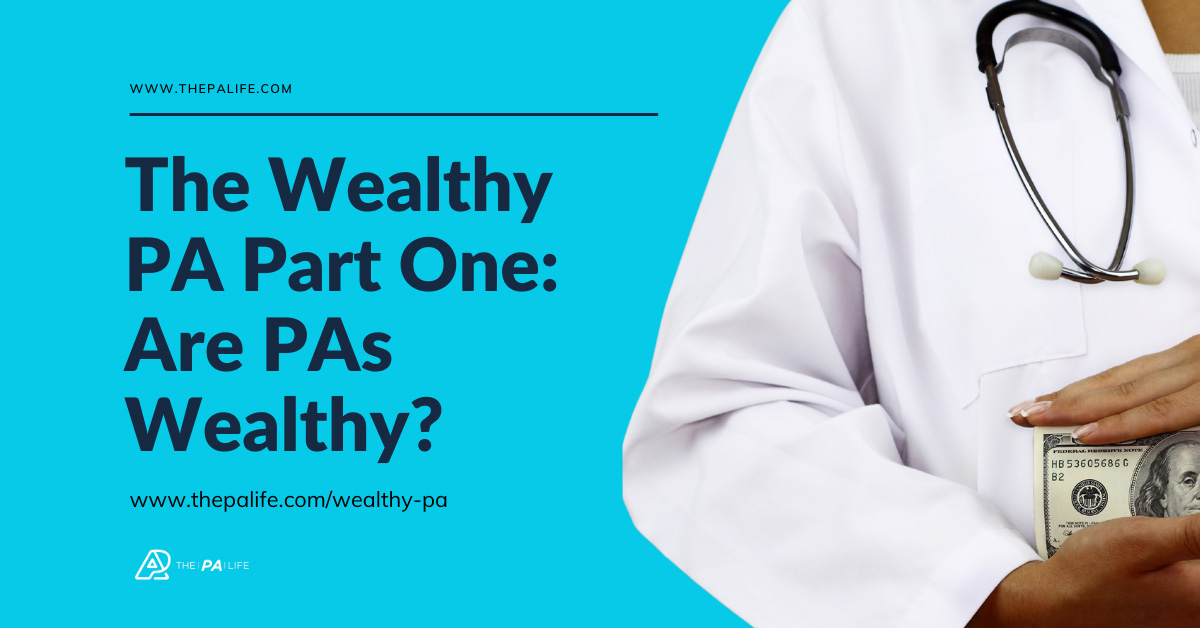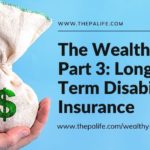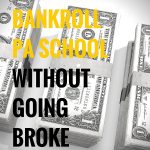
View all posts in this series
Having a PA degree confers wealth status.
With the average annual salary of certified PAs estimated at $120,204 and a median annual salary of $115,000, as a PA, you will be in the top quartile of earners in the United States.
So, it came as a surprise that while I was a student on rotations, I noticed an alarming number of PAs who were burnt out, had terrible work-life balance, and carried enormous amounts of debt.
Many lived paycheck to paycheck despite having a six-figure income. Something wasn't right!
Rather than feeling relieved after graduation from PA school, I was bombarded by important money decisions that revealed my financial illiteracy.
As I dove into my career as a newly minted PA-C, I continued to meet many well-intentioned PAs, NPs, and MDs who shared a similar story. They were drowning under student loan debt, moonlighting on the weekends, clocking in 40- and 50-hour workweeks, and making six-figure incomes with little (or nothing) to show for it.
Suffocating under this debt, some were considering returning to school, financed by more student loans, earning an advanced degree, or pursuing medical school.
What? Are they crazy?
A rude financial awakening

I entered PA school with around $34,000 in undergraduate student loan debt.
Attending Rutgers University, a three-year master's PA program, I quickly started to add to this number. As a kid growing up in Stockton, CA, with two parents surviving on public school teacher salaries, I understood the value of a dollar.
To pay for baseball cards and movie tickets, I started mowing lawns in 8th grade. As I entered high school, this blossomed into what many would now call a "side hustle." I cared for the homes and yards of several well-off local senior citizens and their families, doing everything from digging ditches, pruning trees, cleaning gutters, providing childcare, you name it! At $12 an hour, I felt like I had won the lottery.
I saved this money, earned a pair of high school scholarships, and brought this to undergrad at the University of Washington. I worked part-time at the campus health center while pursuing my degree in Zoology and completing my pre-med/pre-PA prerequisites.
During the summers, I did everything from flipping Whoppers, driving forklifts, building portable schoolhouses, painting apartment buildings, receiving freight for Cost Plus, and singing silly songs as a camp counselor.
Recognizing an opportunity to combine a scholarship and my passion for underserved, community-oriented, universal healthcare, I applied for the NHSC scholarship during my first year in PA school and was rejected. I tried again in my second year and was accepted.
As an NHSC scholar, I received a small monthly stipend for housing and incidentals, and the NHSC paid for the final two years of my PA school education.
You can read more about my NHSC journey here.
When I graduated from PA school, I had $50,000 in student loan debt, which seems reasonable compared to the latest NCCPA Statistical Report declaring an average PA student graduate education debt of $116,733.
As an NHSC scholar, I transitioned from the life of a broke PA student to that of a less broke family practice PA. I found my perfect spot in a small farming community in rural central California and set up shop for the next ten years. My wife, a registered nurse, did the same.
Hard financial lessons

I haven't talked about money management much on this blog, but I am passionate about it.
It makes logical sense that if we spend a lifetime working to earn money, at least a portion of this time should be spent learning to manage it!
In 2007, after we had fully paid off my student loans and moved our family (now three) from central CA to the coastal town of Santa Cruz, we bought a home. This was our second home purchase. During the financial meltdown of 2008, this home lost ~35% of its value, and we, like many other Americans during that time, found ourselves "underwater."
This doesn't seem like much of a setback in 2023 when home prices are again soaring to new highs, but in 2008 it felt like the end of the world. Like Avengers Endgame - what we did have in retirement savings seemed to have dissolved overnight, and our house, a small downtown fixer-upper in the college district, a starter home for our growing family, felt like a noose around my neck.
I watched as most of my colleagues (fellow PAs, MDs, NPS, MAs, RNs), many with young families, foreclosed on their homes or made short sale payoffs, destroying their credit for years to come. Everyone's job was at risk. The hospital where I worked (and the city I grew up in) went bankrupt. On top of losing their homes, many people also lost their jobs.
The sense that I had control over my life and my family's financial future proved illusionary. Like many around me, even to this day, the "American dream" would be forever changed.
Taking back control

To make a long story short, we didn't foreclose on our home, and I didn't lose my job.
We did move out of our house for two years and rented it to a group of four University of California college students. This was our first experience as landlords.
What we saved on our mortgage (and made in rental income) we poured back into regaining our financial footing. I picked up my first book on investing, and instead of selling the stock portions of my retirement funds (like many of my colleagues), I took my newfound knowledge and 10x'd our retirement contributions maxing out company's 401K's and opening 529 college savings accounts for our (now two) kids. In 2010 we moved back into our home.
During this time, I read another investment book, continued to work my 9-5, and chose to innovate from 5-9 pm. I explored different streams of income, read more books, took a night class with my wife on personal finance, and even filed two provisional patents with the USPTO. I started a blog on a new and upcoming platform called WordPress, documenting some of my journeys.
In 2012 I started a second blog to share my love of the PA profession and called it "The PA Life."
Easy choices equal hard life, hard choices equal easy life
I heard this saying once "Easy choices equal hard life, hard choices equal easy life." It's counterintuitive, but it's mostly true.
A whole bunch of things happened during this time which continued to prove challenging. The name for this, as time has taught me, is life.
But my journey down the road of financial education paid off:
- If you look at the curve of the US stock market, you will see that deciding in 2008 to hold, buy, and increase contributions during a time when everyone else was selling and cutting back on contributions was a great decision.
- Flipping some of the common investing advice on its head by investing more while I am young will pay off - the magic of compounding!
- Making small sacrifices to eliminate high-interest debt is incredibly liberating and smart.
- Our house, which seemed like the worst purchase decision in 2008, now makes me look like a genius in 2023. Better yet, it's fully paid off!
- Becoming unintentional landlords proved much easier than I had thought and was a good push into the world of real estate - something I had never considered but can be a fantastic source of passive income.
- The word wealthy is like the word happy; it means something different to everyone. Both can be cannibalized by debt.
- Creating something for others to enjoy that serves others enhances everyone's life. Earnings are a byproduct of how well you serve your audience.
Having a PA degree confers wealth status?

Let's come back to the first sentence of this post: Having a PA degree confers wealth status.
Is this true?
I would argue that having a degree as a PA does confer wealth status, but it does not make you wealthy.
You can guess what I'm going to say next. . . Only you can make yourself wealthy.














How did you 10x your company 401k? What vanguard fund would you recommend?
I am a practicing PA for 10 years in neurosurgery and looking to start investing. Better late than never!
Hi Kimmy, I read A LOT of investment books and have evaluated (and tested) several investment strategies over the years. My personal favorite is covered in the book “A Simple Path to Wealth by JL Collins” https://amzn.to/3C6NsOM.
He prescribes a simple two fund strategy using VTSAX (Vanguard Total Stock) and VBTLX (Vanguard Total Bond). Again, it’s essential that you read or listen to the book to be fully on board with this type of investment strategy. There are also various considerations like making sure you are using and maxing out all your investment vehicles like your Roth IRA, your company 401K (investing to meet your match and decrease your taxable income), tax-sheltered HSAs, etc.
Once you have maximized all your tax-sheltered investment vehicles and you have an emergency fund you can be creative. I have accounts at Vanguard, Robinhood, Fidelity, and M1 Finance and over the years have had exceptionally good returns by investing early in certain technology stocks (and no I didn’t buy bitcoin 🙂 ). But it is important to know that buying individual stocks is risky and for most portfolios, a simple buy and hold strategy of VTSAX and VBTLX will outperform. I could go on and on, and if you have more questions let me know here and I will happily answer them here.
Stephen
Thankyou Stephen! Will definitely get the book you recommended!
I think the issue is no one is taught personal finance in grade school through college/grad school. Everyone wants to be a doctor/lawyer and we assume that once you complete your education, you’re “rich”. You find yourself surrounded by people who drive nice cars, have big houses, and go out to eat all the time and you feel the pressure to suddenly be on that level. So you work hard and accumulate debt and find yourself in a vicious cycle of living above your means and finding all your paycheck is going to live this lifestyle and I think I turn is probably the major cause of burnout because you can’t keep up.
We have to normalize that it’s okay to have some student loans from grad school and that it’s okay to drive a beater and live in a small apartment for a few years to pay off any debt you have. Then, once you get rid of that debt and follow some basic personal finance principles (living below your means), the sky is the limit.
Amen Jeff!
I think anyone pursuing a career in medicine that requires upfront educational debt to be followed by a good salary NEEDS to have good financial knowledge
Questions like: should I pay off my debt ASAP or pay the minimum to save/invest is a VERY IMPORTANT but complex personal question that everyone in medicine needs to tackle. The wrong choice can means hundreds of thousands of dollars over a life time.
There’s the psychological burden of debt, but historically, investment returns are MUCH better than current interest rates.
Thanks for the insight but I believe many are still in debt because they do not know how to live by limits! Just like you, I had undergrad partially paid for and was $10 k to owe, PA school was expensive went to Finch in Chicago cost me about 60k, so coming out with 70K, I did a deferment for the first year with economic hardship since I wanted to do service overseas for a year, that was approved and came back within 6 months, got a Hospitalist position that worked usually 16 hr shifts, but I lived at home to get my feet together, so put a majority of my checks to my loans! Then about another 4 months into this extended that deferment with volunteers programs and changed to a job that worked 3 days a week and still kept my Hospitalist job! I paid off that 70k in about 1yr and 10 months by just keep paying on them. Mind you my first position only pay 60k, and my second was 80k… this was the early 2000! And just like you I did not take out cash for 2008, kept it in and bought some property! I believe many are not taught financial education and it should be to not be in constant debt! I have multiple PA still in lots of debt and some are like me 20-24 years out! Just made wrong decisions! Thanks this was very encouraging. I would like to know if you could do anything about another topic… with COVID-19, burning out has gotten really bad and I personally have no desire to help anymore! Patients are very rude know everything and not very complaint where I work! I love my job and my colleagues and love working with oncology! But I want to see what other options are out there other subcareers- like informatics as a PA, or pharmaceuticals roles! Could you do any articles in this nature??
Hi Namisha! I love your comment!
You are right that most of us are never taught financial literacy from the start, and with a solid foundation in even basic finance principles, many of the common pitfalls could be avoided. Also, the system does not “default” for success, and there are many people out there who will happily take your money in exchange for bad advice that mostly serves their bottom line. It’s very nuanced, and of course, everyone’s situation is different… so many factors that affect our long-term financial security/stability. It’s good to see you found your way!
In regards to burnout, I get it. I am 100% confident that I could not return happily to a 40-hour (50 hours in reality) workweek as a PA. I work 20 hours at a clinic I love (in an area of medicine I am passionate about) and balance this against my pursuit of helping PAs through this site along with my board review site at http://www.smartypance.com. This, of course, is more of a self-made (accidental entrepreneur) “subcareer,” which has been so fun and so rewarding. As you mentioned, there are many sub careers in informatics, pharmaceuticals, telehealth, consulting, etc. I have not written about this before on the blog, but it would be fun to explore the various options for PAs in a blog series. If you are interested in researching this and working on a blog series with me, I am game. It would be fun to connect with other PAs doing this work and learning about the various pathways. Of course, anytime you go part-time, the various drawbacks inherent to the American way (such as employer-sponsored health insurance) come into play. I have navigated this creatively over the years and should probably even write a blog article about this. I have learned a lot through constant trial and error.
Thanks!
Stephen
Stephen,
I’d love to collaborate on something regarding alternative PA careers. Personally, I’m navigating it right now! I’ve been full time clinical for eight years and know I need to make a change. For a few years I’ve been exploring alternative routes